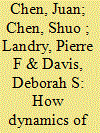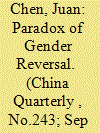|
|
|
Sort Order |
|
|
|
Items / Page
|
|
|
|
|
|
|
| Srl | Item |
| 1 |
ID:
141106


|
|
|
|
|
| Summary/Abstract |
Using a 2011 national survey of urban residents, irrespective of their official hukou status, and the 2000–2009 night-time light data from the Defense Meteorological Satellite Program Operational Linescan System (DMSP-OLS), this paper goes beyond the simple dichotomy of migrant versus non-migrant or rural versus urban hukou to disentangle the processes of urbanization and migration and their complex associations with health, and assesses the impact of various levels and speed of urbanization on the physical and mental health of current residents in a city or town. By disaggregating urbanization into three discrete dimensions at sub-provincial levels, we find that while a higher absolute level of urbanization at the county level negatively impacted self-reported physical health, faster and accelerating urbanization had a positive impact which could be attributed to the demand-pull effect underlying the healthy migrant phenomenon. By contrast, all three dimensions of urbanization were associated with greater depressive distress and thus had an adverse effect on residents' mental health. Beyond demonstrating how variation in the process and location of urbanization affects individual health, we also illustrate more broadly the value of modelling locational parameters in analyses of individual outcomes based on national samples.
|
|
|
|
|
|
|
|
|
|
|
|
|
|
|
|
| 2 |
ID:
175564


|
|
|
|
|
| Summary/Abstract |
This study examines the masculinity of Chinese male migrants who earn their living as “dance hosts.” Dance hosts partner middle-aged women in dance halls, sell experiences of intimacy and engage in ongoing romantic relationships with their female clients. This article seeks to capture an intimate and “up-close” portrait of (heterosexual) male dance hosting, and then further addresses dance hosts’ masculine subjectivity by examining the coping strategies they use to overcome the stigma attached to their profession and to assert their masculinity. Ultimately, the article argues that the process of masculine subjectivity formation in the case of male dance hosts is structured by dominant norms of Chinese masculinity. Although seemingly highly subversive, the relationship between dance hosts and clients in fact fulfils conventional gender ideals and encourages the perpetuation of traditional gender roles in China's patriarchal society. This work seeks to offer an understanding of traditional gender norms (or ideals) through the lens of normative Chinese masculinity within the context of a stigmatized occupation.
|
|
|
|
|
|
|
|
|
|
|
|
|
|
|
|
| 3 |
ID:
088693


|
|
|
| 4 |
ID:
185970


|
|
|
|
|
| Summary/Abstract |
Urbanization in China has involved not only the large-scale transfer of population from rural to urban areas through processes of labor migration and land dispossession, but also the re-designation of rural areas and populations as urban through top-down administrative conversion. Despite their significant role in accelerating rural urbanization, in situ processes of administrative-territorial change have remained under-examined in the literature. Drawing on a national survey of 40 townships, this article sheds light on the strategies by which territorial urbanization is achieved at the township level. By comparing the socioeconomic profiles, employment, land ownership, housing conditions, and social welfare coverage of 3,229 respondents, the article demonstrates how different pathways of territorial urbanization map onto differentiation in livelihoods among urbanized rural residents.
|
|
|
|
|
|
|
|
|
|
|
|
|
|
|
|
|
|
|
|
|